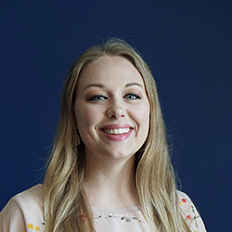
Stephanie Keiper '20 MA-MFT
Therapy
Helping Others Tell Their Stories
Stephanie Keiper ’20 MA-MFT grew up wanting to be a paleontologist, but after finding a passion for communication she knew therapy was her true calling.
MMU: Why do you want to be in a helping profession? How did your passion in marriage and family therapy begin?
SK: Honestly, I never thought that I would be studying this particular degree. I envisioned my life going quite differently since I always wanted to be a paleontologist. However, as I grew older, I found a passion in communication and helping others. I feel energized and motivated to hold space for people to tell their stories. It is so powerful to be present with clients and to help them on their journey of healing and self-exploration. It is a humbling experience filled with twists that not only challenge my clients, but also myself. We never stop learning.
I feel energized and motivated to hold space for people to tell their stories. It is so powerful to be present with clients and to help them on their journey of healing and self-exploration.
MMU: What population would you want to work with? What draws you to that population?
SK: I have worked with a wide range of people and I don’t have a preference as to a population to work with. I have worked with children, teenagers, college students, adults, couples, and families. The great thing about this master’s degree program is that it lends itself to getting the opportunity to work with individuals of all different populations.
MMU: What attracted you to Mount Mercy’s Master’s in Marriage and Family Therapy program? What was your motivation for pursuing a master’s degree?
SK: While I was in undergrad I knew that I wanted to pursue a graduate degree. The thing that drew me to this program was not just the proximity to home, but also the size and curriculum. This program is small, but it fosters a great sense of community within its students. I have learned more from my peers and their experiences than I could have ever imagined. Also, the curriculum for this degree forces us to look deep within ourselves, which is something that aids us in our journey to becoming a better therapist.
"I have learned more from my peers and their experiences than I could have ever imagined."
MMU: How are you building your skills in and out of the classroom?
SK: This program promotes self-exploration, so it takes place inside and outside of the classroom. Many of the students within the program do therapy within the community at various sites. There we are given the opportunity to create connections with licensed clinicians and put our education into practice. As far as within the classroom, our professors are all licensed and practicing clinicians. They have experience that spans years and often helps us to apply what we are learning to real-life examples.
MMU: How do you see yourself using the skills you’re building in the program? The program incorporates clinical hours—how has this impacted your experience?
SK: Practicum allows every student to use the skills that they have learned within the classroom. For completion of our program and to be able to apply for temporary licensure post-graduation, every student must satisfy 300 client contact hours. These hours come from sitting with individuals, couples, families, etc. This process has made my learning very experiential and hands-on. It can be challenging at times to implement certain skills because they are vastly different in books than in real-life. However, it is so beneficial to be able to put the educational elements into practice and have our professors help us through constructive feedback.
MMU: What’s the biggest challenge you’ve faced so far? How did you overcome it?
SK: The biggest challenge that I faced was the initial fear and anxiety surrounding sitting with clients the first time. Our program is geared in a way that allows for a year of academics prior to practicum. I was nervous on implementing skills and therapeutic interventions with the therapy room. My professors were a significant help in decreasing and normalizing my anxiety surrounding this. Still, I have days when I doubt myself or need help with a specific intervention. Having our professors as our supervisors on client cases is so important and beneficial. It has helped me to grow in more ways that I could have imagined.
Having our professors as our supervisors on client cases is so important and beneficial. It has helped me to grow in more ways that I could have imagined.
"I learned so much about myself as well as how to become a budding therapist. The connections that you make within this program are essential in helping you to experience the most."
MMU: What was one class or lesson that stuck with you? Why do think it impacted you? Is there a specific person or program that has made obtaining your degree easier?
SK: There were many classes that were impactful and eye-opening throughout the program. One class, Therapeutic Techniques with Parents and Child, was very fascinating and helpful in opening the door to psychoeducation. I have used the information that I learned from the class with not only my clients, but also college students at MMU through in-class presentations. As far as what has made my degree easier, I believe that the collaboration between the professors and the students helps immensely.
MMU: What’s one piece of advice you would give to future students?
SK: I would like to tell future students that this program is not easy. It challenges you in many ways that you are not prepared for. I learned so much about myself as well as how to become a budding therapist. The connections that you make within this program are essential in helping you to experience the most.